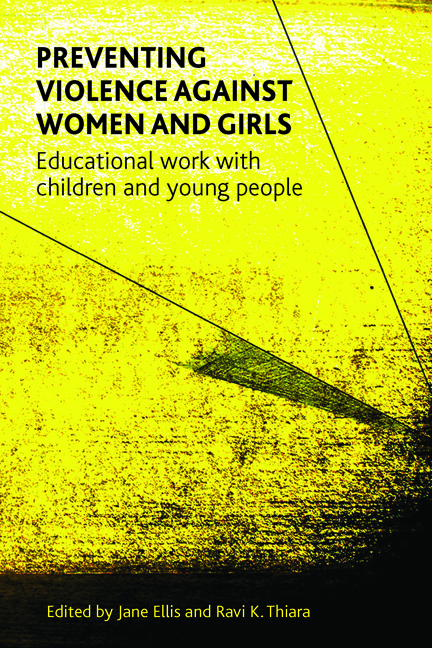Book contents
- Frontmatter
- Dedication
- Contents
- List of tables and figures
- Notes on contributors
- Acknowledgements
- Foreword
- Introduction
- one Preventing violence against women and girls through education: dilemmas and challenges
- two Does gender matter in violence prevention programmes?
- three Responding to sexual violence in girls’ intimate relationships: the role of schools
- four ‘Pandora’s Box’: preventing violence against black and minority ethnic women and girls
- five Preventing violence against women and girls: a whole school approach
- six What did you learn at school today? Education for prevention
- seven No silent witnesses: strategies in schools to empower and support disclosure
- eight Preventing sexual violence: the role of the voluntary sector
- nine ‘Boys think girls are toys’: sexual exploitation and young people
- ten MsUnderstood: the benefits of engaging young women in antiviolence work
- eleven Shifting Boundaries: lessons on relationships for students in middle school
- Concluding remarks
- Appendix: Examples of programmes in the UK
- Index
nine - ‘Boys think girls are toys’: sexual exploitation and young people
Published online by Cambridge University Press: 04 March 2022
- Frontmatter
- Dedication
- Contents
- List of tables and figures
- Notes on contributors
- Acknowledgements
- Foreword
- Introduction
- one Preventing violence against women and girls through education: dilemmas and challenges
- two Does gender matter in violence prevention programmes?
- three Responding to sexual violence in girls’ intimate relationships: the role of schools
- four ‘Pandora’s Box’: preventing violence against black and minority ethnic women and girls
- five Preventing violence against women and girls: a whole school approach
- six What did you learn at school today? Education for prevention
- seven No silent witnesses: strategies in schools to empower and support disclosure
- eight Preventing sexual violence: the role of the voluntary sector
- nine ‘Boys think girls are toys’: sexual exploitation and young people
- ten MsUnderstood: the benefits of engaging young women in antiviolence work
- eleven Shifting Boundaries: lessons on relationships for students in middle school
- Concluding remarks
- Appendix: Examples of programmes in the UK
- Index
Summary
Introduction
Although prevention work on domestic violence with young people has gained currency, sexual exploitation remains an under-addressed area. This chapter draws on an evaluation of a three-year prevention programme on sexual exploitation in schools and youth settings delivered across London between 2007 and 2010 through a partnership between a community-based women's organisation and a national organisation providing services for children (for the full report, see Coy et al, 2011). The programme consisted of three strands and included workshops with young people (mixed or single gender groups), training for professionals on sexual exploitation, and facilitator training for young people to co-deliver these sessions for professionals. By highlighting the issues raised by research on sexual exploitation as well as the findings of the evaluation (focusing on one aspect of the work – the work delivered to young people) this chapter underlines the importance of prevention-education on sexual exploitation with young people as well as the need for training for professionals so they can better identify and support young people who may be sexually exploited. Evaluation findings reinforce the need to adopt a gendered approach, to involve young people as co-facilitators, to deliver work in settings such as schools and youth work and to train professionals. However, adopting a gendered frame is not without its tensions and challenges, issues which we will discuss throughout this chapter.
Context
Sexual exploitation is not a new phenomenon but it has received increased research and policy attention over the last decade. This has culminated in the recent inquiry into Child Sexual Exploitation in Gangs and Groups (CSEGG), conducted by the Office of the Children's Commissioner, which identified 16,500 children as at risk during April 2010–March 2011 and 2,049 children as being victims of sexual exploitation in gangs and groups during the 14-month period from August 2010 to October 2011 (Berelowitz et al, 2012: 9). However, it is likely that these numbers are far higher as many children and young people are often invisible to services. This inquiry also reinforces the findings from previous research that highlights the inability of professionals to identify child sexual exploitation (CSE) or to support victims. Recent high profile trials and subsequent convictions of Asian men involved in the sexual exploitation of white girls have resulted in a racialised discourse about the victims and perpetrators of CSE.
- Type
- Chapter
- Information
- Preventing Violence against Women and GirlsEducational Work with Children and Young People, pp. 181 - 204Publisher: Bristol University PressPrint publication year: 2014



